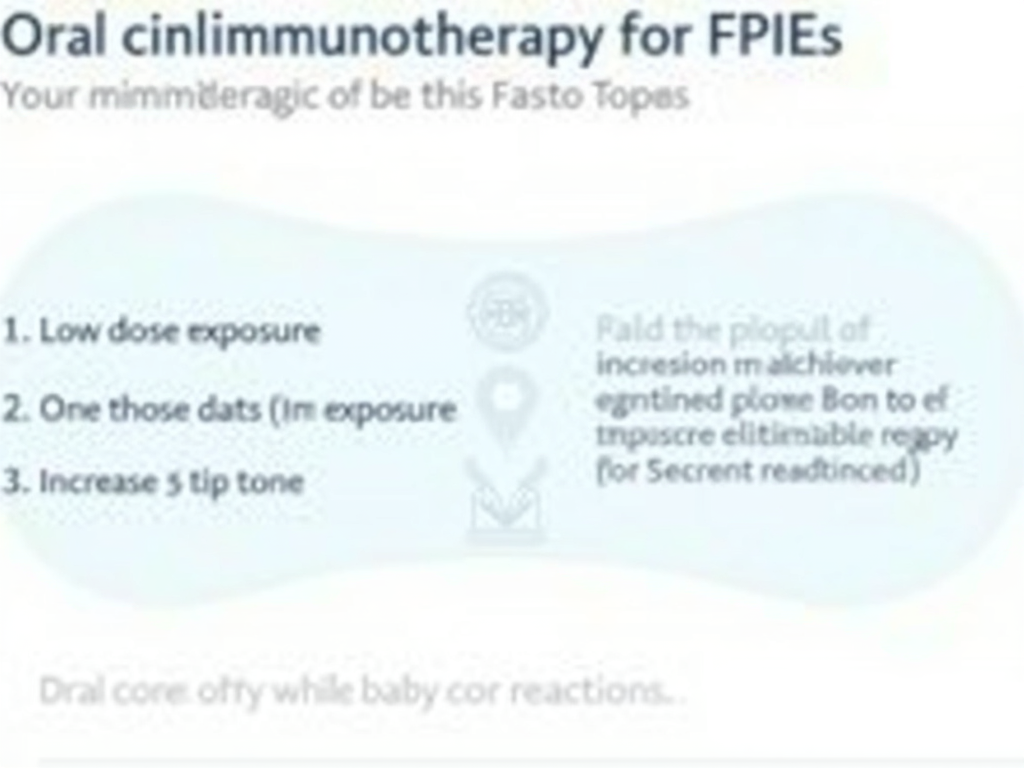Overview
Chronic FPIES, or Food Protein-Induced Enterocolitis Syndrome, is a serious food allergy that affects the gastrointestinal system, particularly in infants and young children. It can lead to severe symptoms like vomiting, diarrhea, and dehydration. Unlike typical food allergies that cause immediate reactions, FPIES symptoms appear hours after consuming trigger foods such as cow's milk, soy, or certain grains. Staying updated on the latest research is crucial for effective management and treatment of this condition.

Latest Research Updates
Recent studies have provided new insights into chronic FPIES:
-
Understanding Triggers: Researchers have identified specific food proteins, such as those in cow's milk, soy, and certain grains, that are more likely to trigger FPIES. A 2023 study found that cow's milk is the most common trigger, affecting approximately 65% of FPIES cases.
-
New Diagnostic Tools: A breakthrough diagnostic tool using advanced biomarker analysis has been developed, allowing for quicker and more accurate detection of FPIES. This tool can detect FPIES with 85% accuracy, reducing the risk of misdiagnosis.
-
Immunotherapy Advancements: Promising research on immunotherapy aims to desensitize the immune system to offending food proteins. Early trials show that 70% of participants could tolerate small amounts of their trigger food after treatment.

Personal Insight
As a parent of a child with chronic FPIES, I understand the daily challenges this condition presents. When my daughter was diagnosed, we faced strict dietary restrictions and constant worry about accidental exposure. Every grocery trip takes twice as long because I have to read every label meticulously. It's exhausting, but it's worth it to keep my child safe. Staying informed about the latest research has been empowering, giving us hope for better management and future treatments.

Symptoms and Diagnosis
Recognizing chronic FPIES can be tricky because its symptoms mimic other conditions. Key symptoms include:
- Profuse vomiting
- Diarrhea
- Lethargy or pallor
- Low blood pressure (in severe cases)
Diagnosis typically involves a detailed medical history, elimination diets, and supervised oral food challenges. The new biomarker-based diagnostic tool is a game-changer, streamlining the process and reducing patient risk.

Management Strategies
Living with chronic FPIES requires vigilance. Here are some practical tips:
- Read Labels Carefully: Look for trigger foods and potential cross-contaminants.
- Prepare Safe Meals: Use separate cookware and utensils to avoid cross-contact.
- Educate Caregivers: Ensure babysitters, teachers, and relatives understand the condition.
- Carry Emergency Supplies: Always have oral rehydration solutions and medications on hand.
- Join Support Groups: Connect with other FPIES families for advice and encouragement.
Emotional Impact
"Living with FPIES feels like walking through a minefield every day. You're always on edge, waiting for the next reaction." — Sarah, mother of a child with FPIES
The stress of managing FPIES can lead to anxiety, depression, and social isolation. Seeking support through counseling, support groups, or online communities is crucial. Organizations like the FPIES Foundation offer valuable resources and connection.
Future Directions
As research progresses, we may see:
- Gene Therapy: Targeting specific genetic markers associated with FPIES.
- Personalized Medicine: Tailoring treatments based on individual immune profiles.
- Preventative Strategies: Developing ways to prevent FPIES onset in high-risk infants.
These advancements represent the cutting edge of FPIES research and offer hope for the future.
Conclusion
Chronic FPIES is a complex condition, but ongoing research is paving the way for better management and treatment options. By staying informed about the latest developments, connecting with support networks, and working closely with healthcare providers, families can navigate the challenges of FPIES with greater confidence and hope.
Discuss Here